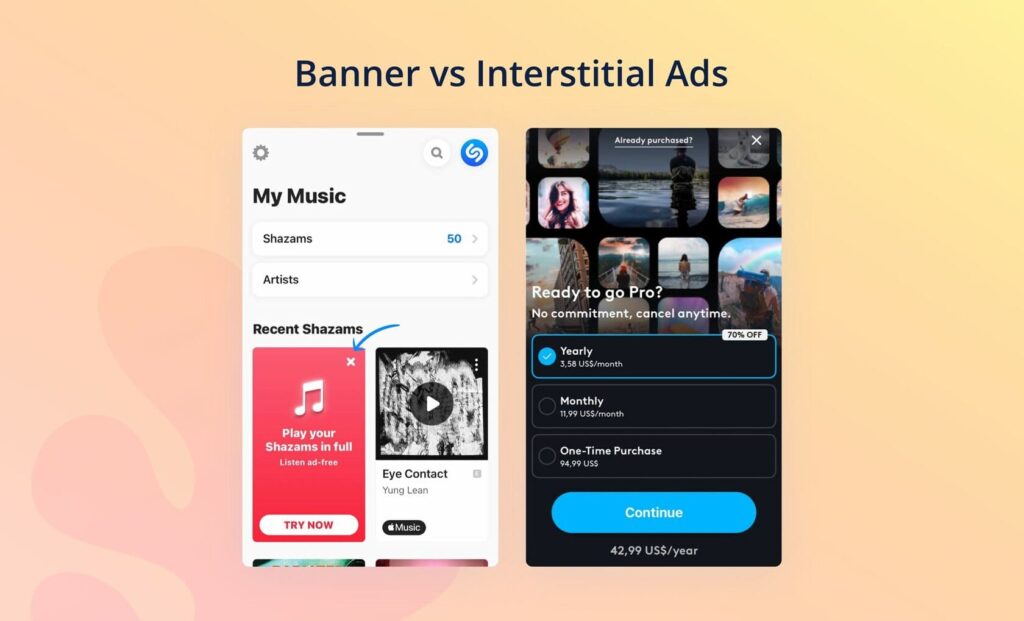Mobile interstitial ads have appeared almost immediately with the development of the Internet. The most popular options previously included banners and pop-ups, which appeared suddenly whenever you tried to access specific sites or information on the web. As pop-ups can be extremely annoying when you see them frequently, developers came up with different types of pop-up blockers, which can be installed on your device and automatically block any pop-ups from displaying.
Table of Contents
When it comes to modern times, ads similar to pop-ups are now commonly referred to as mobile interstitial ads. If you are an active user of mobile apps and games, you are more than likely to have seen them many times. In this article, you will learn more about mobile interstitial ads, their peculiarities, and some regulations that are applied to them.
What Are Mobile Interstitial Ads?
How do interstitial ads work? When it comes to the interstitial ad definition, these types of ads are designed to be shown full-screen and are interactive. Most commonly, such advertisements are displayed to users when they use mobile apps or play games on the phone. The main peculiarity of such ads is that they cover the entire screen, which means that it’s impossible not to notice them. If we take a look at mobile interstitial ads vs pop up, the latter can be different in size so users have more of a chance to ignore them.
With mobile interstitial ads, users can close them when they notice the “x” sign, or they can click right on them and will be taken to the intended destination. It is important to note that there are some rules established by Google when it comes to when such ads can be shown. The most important condition is that they have to be displayed during transitions so that they don’t destroy the user experience.
As for the format, these types of mobile advertisements can be varied in the best Google Play apps. For instance, they can appear in the form of still images, or they can be made in a video format and have audio. It is common for image ads to come with the closing “x” sign right away, but the situation is different with video ads. It is common for developers to make video ads in such a way that you need to wait several minutes before you get an opportunity to close them.
A lot of developers also wonder — how much do mobile interstitial ads pay? The numbers can significantly vary depending on your location, the number of impressions, and other factors. Similar to other formats, developers earn money once someone actually clicks on their interstitials. One thing that can be said for sure is that the CPM prices of such ads are higher compared to other formats.
Mobile Interstitial Ads Size
As has been previously mentioned, mobile interstitial ads cover the entire screen of a mobile phone. The standard and most commonly developed size for such ads is 320 x 480 pixels. By taking a look at the Android mobile interstitial ad example, it becomes clear that, when you get such an ad, you won’t see any space above, below, or on the sides of it.
This advertisement size gives an obvious call to action and also provides more opportunities for creativity, as they are not as limited by space as banners and pop-ups. Thanks to the size, interstitial ads ensure better engagement, so you are likely to get more people clicking on them if you do everything correctly.
Banner vs Interstitial Ads
A lot of people who are new to ads are confused by the difference between mobile interstitial ads and banners. The main difference is that interstitial ads always cover the entire screen while banners work like pop-ups that are smaller in size. Because of these mobile interstitial ad specs, they are considered more effective as they are almost impossible to ignore and they truly catch the attention of users. Interstitials have a number of advantages over banners and are known for providing higher impression rates.

What are the main reasons to use such ads?
How to monetize an app? Monetization with the help of mobile interstitial ads is one of the most convenient and effective ways to make your application profitable. A lot of large companies prefer relying on interstitial ads these days because of the high level of effectiveness that they show. Marketers have already noticed the following advantages of using interstitial ads and they include such:
- Interstitials can be made more creative compared to other ads.
- People are likely to pay more attention to big interactive advertisements.
- A higher impression rate is achieved thanks to the large size of the ad.
- Better conversion rates thanks to the higher click-through rates.
When you follow the rules related to these ads, you can convert a larger number of users into customers who purchase the services or products that you advertise.
What are the important rules established by Google for such ads?
Interstitials that show up at the worst moments and are also difficult to close, especially on mobile devices, can negatively affect the user experience or even completely ruin it. Those who are new to the concept of interstitial ads might not be aware that there exist official Google rules when it comes to them. The company penalizes pages that include interstitials and violate official guidelines. The reason for establishing such rules is to make sure that ads don’t become intrusive and run the user experience.
To put it simply, anyone who wants to play an ad and comply with the rules should keep the following in mind:
- You should avoid placing two or more ads one after another.
- Ads don’t have to repeat after each step or action a user takes.
- Ads should always appear during the moments of a natural transition.
There are some exclusions from the mentioned rules. For example, age-restriction interstitials can be shown the moment you open a certain app. Also, these limitations do not apply to informing users about cookies.
Interstitial Ads Best Practices
It’s not enough to just develop a certain ad, but it is also highly important to plan things out properly to get the best results. You should know when to show interstitial ads and how. These rules can be applied whether you put ads in an Android app or an iOS one. Let’s consider several essential ads practices.
Decide on the frequency of advertisements
When it comes to the frequency of advertisements, it is important to maintain a balance so that users are not bombarded with too many ads and become annoyed. At the same time, you don’t want to have too few ads because then you won’t generate enough revenue. A good rule of thumb is to show one ad for every two pieces of content.
User-friendly experience
It is important to make sure that the ads you are displaying are user-friendly and not intrusive. This means that they should be relevant to the user’s interests and not interrupt the flow of the content. Additionally, the ads should be placed in locations where they will be easily seen but not in the way of the content.
Avoid overwhelming users with ads
As mentioned above, it is important to strike a balance with the number of ads you show. However, it is also important to make sure that the ads you show are relevant and not overwhelming. Users should not feel like they are being bombarded with too much information or that they can’t escape the ads.
Make sure users are directed to the right landing pages
The effectiveness of ads also depends on where you direct users that click on your in-app interstitial. You should make sure that when a person clicks on your advertisement, they go right to the needed landing page and not just your site where they need to find information on their own. Having a high-quality post-click page will ensure that you lose fewer potential leads and can provide users with the right information without distractions.
Work on having natural transitions
Timing is everything when it comes to ads because you obviously don’t want them to be so intrusive that users simply give up on an app. You should make sure you choose the most natural moments to show interstitial advertisements to users. For example, it’s not a good idea to put such an ad without any warning when a person is playing a game where they need to continuously tap on the screen. This will only cause a person to get frustrated.
Instead, you should find a moment when there is a natural pause in the game, such as going to another level, loading some elements, and such. The most important thing is that users are not caught off guard when they concentrate on a certain task or are actively involved in intense gameplay.
You should make sure that the audio from the actual game is not played during the ad, as this will prevent a person from concentrating on your message. There needs to be a clear pause in the game when you can place your interstitial ad without any damage.
Use Interstitial Ads Correctly and Get the Benefits
Interstitial ads are the future, especially for linear apps. They have numerous advantages over standard pop-ups and banners, so it’s not surprising that many companies implement them in their campaigns. This format of ads brings better impression rates to developers, and the same can be said about conversion rates. As a result, you will be able to generate more revenue.
You should also keep in mind that you cannot just use these ads all the time and whenever you want. There are some restrictions accepted by Google that regulate the use of interstitial ads so that they don’t negatively influence the user experience. When used the right way, interstitials can be highly useful and bring the desired level of monetization.




